We continue with our series on stupidity. This next essay was written in April 2002. See: 1) The Basic Laws of Human Stupidity -1987. 2) The Power Of Stupidity -June 1996 3) The Power Of Stupidity Revisited -September 1996. All are reposted from Gandalf.
Giancarlo Livraghi
The essence of stupidology is an attempt to explain why things don’t work—and how much of that is due to human stupidity, which is the cause of most of our problems. And even when the cause is not stupidity we make the consequences much worse by being stupid in how we react or try to fix the problem.
Essentially, this analysis is diagnostic, not therapeutic. The idea is that, if we understand how stupidity works, we may be able to control its effects a little better. It’s impossible to defeat it altogether, because it’s part of human nature. But its effects can be significantly reduced by knowing it’s there, and understanding how it works—and thus not being caught by total surprise.
I’ve discussed this, to a limited extent, in The Power Of Stupidity. (As all stupidologists know, the subject is so vast that such short comments can only scratch the surface; but if I’ve been able to prompt readers to think about it, that is the biggest achievement I could possibly imagine.)
The stupidity of every single human being is a large enough problem. But the picture changes when we consider the stupidity of people who have “power”—that is, control over the destiny of other people.
As in the first two parts, I shall continue to follow the Cipolla definition of stupidity, intelligence etc. But there are substantial differences when the relationship is not of equals. One person, or a small group of people, can influence the life and wellbeing of many more. That changes the cause-and-effect relations in the system.
Power, large and small
Power is everywhere. We are all subject to someone else’s power and (except perhaps in the case of extreme slavery) we all exert power on others. Personally, I loathe the concept, but it’s part of life. Parents have (or are supposed to have) power over their children, but children have a great deal of power over their parents, which they often use quite ruthlessly. We may be “owners” of cats and dogs, horses or hamsters, elephants or camels, sailboats or cars, phones or computers, but quite often we are subject to their power.
It would be far too complicated, for the sake of this subject, to get into the intricacy of human relations. Therefore I shall concentrate on the most obvious cases of “power”: those situations where someone has a defined role of authority over a large (or small) number of people.
In theory, we all tend to agree that there should be as little power as possible, and that people in power should be subject to control by the rest of the people. We call that “democracy.” Or, in organizations, we call it leadership, motivation, distributed responsibility, sharing and personal empowerment—as opposed to authority, bureaucracy, centralization or formal discipline.
But there are relatively few people who want real freedom. Responsibility is a burden. It’s quite convenient to be “followers.” To let rulers, bosses, “opinion leaders”, gurus of all sorts, movie stars and television “personalities” set the pace and do the thinking—and put the blame on them if we’re unhappy.
On the other hand, there is a somewhat special breed of people who enjoy power. Because they are so dedicated to the substantial effort and sacrifice needed to gain large power, they prevail.
We must assume that the Cipolla theory applies: there are just as many stupid people in power as there are in the rest of humanity, and there are always more than we think. But two things are different: the relationship and the attitude.
The power of power
People in power are more powerful that other people. That isn’t as obvious as it sounds. One might argue that this is not always so. There are apparently powerful people with less real influence than some who are much less visible. But for the sake of this discussion we must stay away from that problem. Regardless of how and why actual power is held and used, this is about real power. The uneven relationship caused by the fact that some people have a stronger influence on circumstances than others—and in many situations a few people can do good or harm to many.
A basic definition in the Cipolla theory is that the effect of behavior must be measured not by the yardstick of whoever does something, but from the other end—the point of view of whoever is subject to the effects of that person’s acts (or lack of action.) The clear result of this basic concept is a drastic shift in the Cipolla grid. The harm (or good) is much larger, depending on the number of people involved and the impact of actions and decisions.
If a person in an “equal” relationship gains as much personal advantage as the damage it causes to someone else, that person is a “perfect bandit” in the Cipolla definition, someone else is “perfectly hapless”, and the system as a whole is balanced. This is obviously not so when there is a difference in power.
In theory, we could assume that as the percentage of intelligent or stupid people is the same the effect of power will be balanced. But when power deals with large numbers of people the one-to-one relationship is lost. It is much more difficult to listen, to understand, to measure the effect and the perceptions. There is a “Doppler effect”, a shift, leading to an increase of the stupidity factor. All serious studies of power systems (while they are not necessarily based on the notion that power is stupid) point to the need for power separation, and for power conflicts to be formalized to that they don’t lead to violence, in order to avoid “absolute power” (i.e. extreme stupidity.) That’s a big enough problem to keep us all on constant alert against any exaggerated concentration of power—and to explain why so many things aren’t working as well as they should. But there is more.
The power syndrome
How do people gain power? Sometimes by not even trying. They are entrusted by other people, because other people trust them. They have natural leadership and a sense of responsibility. This process, more often than not, produces “intelligent” power. A situation in which the chosen leaders do good for themselves—and a lot more for others. Sometimes it can lead to deliberate sacrifice, when people do harm to themselves for the benefit of others (if that is done intentionally it doesn’t fall into the “hapless” category because of the moral good, including self perception and the approval of others, gained by the person who deliberately places common good over private interest.) But there are much fewer examples of such “intelligent power” than we would all like to see. Why?
The reason is that there is competition for power. People who don’t seek power per se, but are more concentrated on doing good for others, have less time and energy to spend on gaining more power—or even holding on to what they have. People who have a greed for power, regardless of its impact on society, concentrate on the struggle for power. Most individuals are placed somewhere between the two extremes of that spectrum, with many different shades and nuances. But the powermongering element is the most aggressive in the power game and therefore gains more power.
Even people with the most generous initial motivation can be forced, over time, to dedicate more energy to maintaining or increasing power—to the point of losing sight of their original objectives.
Another element, that makes things worse, is megalomania. Power is an addictive drug. People in power are often led to believe that because they have power they are better, smarter, wiser, than ordinary people. They are also surrounded by sycophants, followers and exploiters enhancing that delusion.
Power is sexy. That isn’t just a manner of speech. There is an instinct in the nature of our species that makes powerful people (or people who appear to be powerful) sexually attractive. Though most people playing the power game are too busy with it to be able to have any decent sex—or to care about emotion, affection and love.
People who have or seek power are as just as stupid or intelligent as any average person. They are often quite clever, astute and mischievous. But if we follow the Cipolla theory, that measures intelligence and stupidity by the effect of behavior, not motive or technique, the result is a definite shift, as shown in this graph, where the red arrow is the “P” (power) factor. It increases the “sigma factor“ in the system and causes a shift from “I” (intelligence) to “S” (stupidity.)
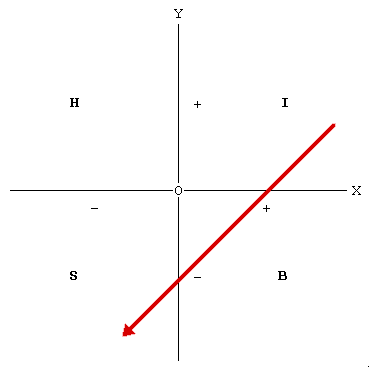
A careful reader may notice that the arrow is on a side.
This is to allow for the fact that a few people
(those in power and their entourage)
gain some advantages—and therefore the shift in the system
is not from the center of the “I” area to “S” but tends to go
from the “Ib” (intelligent bandit) to the “Sb” (stupid bandit) sector.
There are a few other possible hypotheses—that can be analysed using the Cipolla grid.
Let’s assume, for instance, a situation in which “intelligent power” prevails. We would probably see a trend like this.
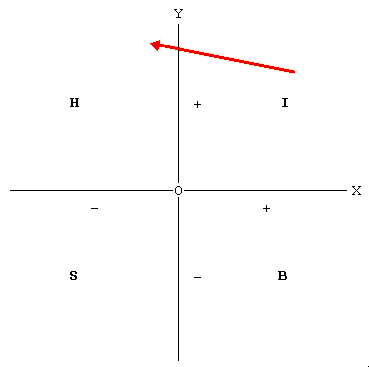
Power, in this case, deliberately chooses to offer greater advantages to the community than to itself, to the point—sometimes—of accepting some disadvantages if they help to improve general wellbeing (as already noted, in this case people in power can not be defined as “hapless” or “helpless”.)
The shift to the upper part of the “Y” axis is unlikely to be fast, but it tends to be steady and consistent. Such situations are not impossible. There are nearly always a few in some parts of the system. But they depend on unusually well tuned, well motivated teamwork—harmonies that aren’t easily generated or reproduced, and can fall apart because of changes in the environment or disruptions in their structure.
Rare as they are, such teams are extraordinarily effective. The observation of history and facts confirms that real innovations and improvements in society are much more likely when there are synergetic teams, active symbiosis, instinctive cohesion and strong humanity.
Carlo Cipolla wrote that ´Whether one considers classical, or medieval, or modern or contemporary times one is impressed by the fact that any country moving uphill has its unavoidable “sigma” fraction of stupid people. However the country moving uphill also has an unusually high fraction of intelligent people who manage to keep the “sigma” fraction at bay and at the same time produce enough gains for themselves and the other members of the community to make progress a certainty.º The result is a situation like the one shown in the next graph (where the red area marks the position of people in power, the green is the rest of the community.)
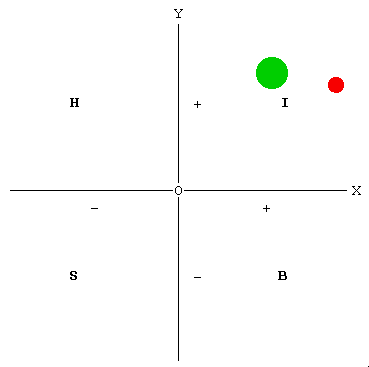
There are no “arrows” in this graph because, in the most favorable circumstances, such a system can remain stable (or make slow progress, as indicated in the first graph.) In a stabilized situation people in power are likely to have greater advantages than the rest, but as this works for everyone’s benefit it isn’t a problem—as long as two (opposed but synergetic) stupidity factors don’t get into the picture: servility and envy.
I don’t want to complicate the picture, but I think there is one relevant comment. In some particularly efficient organizations the two areas overlap, because there is no hierarchy and responsibilities are shared. It’a a well known fact that this is the most “intelligent” form of human cooperation and it can produce extraordinary results.
Such systems era basically strong, but they are exposed to damage. They can be warped by internal problems, such as stupidity factors or power syndromes. Or they can suffer from changes in the environment—or be disrupted by intervention from the outside which (deliberately or by mistake) upsets their delicate balance.
After this short digression on intelligence we must go back to the unfortunately overwhelming subject—stupidity. At the end of his essay Carlo Cipolla pointed out that ´In a country which is moving downhill, the fraction of stupid people is still equal to “sigma”; however in the remaining population one notices among those in power an alarming proliferation of the bandits with overtones of stupidity and among those not in power an equally alarming growth in the number of helpless individuals. Such change in the composition of the non-stupid population inevitably strengthens the destructive power of the “sigma” fraction and makes decline a certainty. And the country goes to hell.º Of course this applies not only to “countries” as nation-states but also to any sort of human community—large or small.
In this case the postion of people in power, and of the rest of the people, is placed as we see in the next graph.
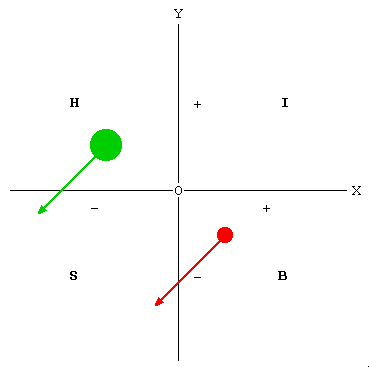
It’s hard to understand, in this type of situation, if the stupidity of power generates widespread stupidity—or vice versa. In most cases both contribute to a “vicious circle” and so the entire system deteriorates, as shown by the arrows in the graph.
Sometimes this trend can be reversed, but that requires a very special combination: the convergence of intelligent people that can gain power and a strong collective thrust for substantial change.
In the absence of such an “intelligent mutation”, or of an outside influence that changes the basic criteria, over time the system tends to explode—that is, to disintegrate.
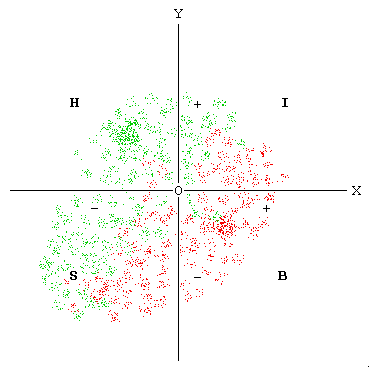
If a “chaotic” situation occurs before there is irreparable damage to the entire ecosystem… almost anything can happen. A turbulent vortex generates countless openings for stupidity, but “intelligent” developments are not totally impossible.
As I said at the beginning—I am deliberately staying away from any specific application of these concepts. But we can all experiment as we wish on all sorts of practical situations (from the general state of the planet to large or small communities.) As Carlo Cipolla suggested at the end of his book, we can print out (or draw on a piece of paper) as many blank grids as we wish—and fill them in by placing individuals or groups of people in the appropriate places.
The pursuit of power increases the stupidity factor. The impact can be relatively large or small depending on the amount of power (the importance of matters influenced by power and the number of people subject to its effects) and on the intensity of the power struggle.
This is the most relevant, if not the only, exception to Cipolla’s Second Law. It remains true that ´the probability of a person being stupid is independent of any other characteristic of that person.º But power, as a system, is much more stupid than any single “ordinary” person can be.
The problem it that power can be limited, controlled, scrutinized and conditioned—but not eliminated altogether. Humanity needs leaders. Organizations need people who take responsibilities, and those people must have some power to perform their role.
So we’ve got to live with power—and its stupidity. But that doesn’t mean that we must accept it, tolerate it or support it. Power should not be admired, trusted or even respected unless it shows practical intelligence in what it does to us and to the world. As far as I can see, there is no “universal” or standard solution to this problem. But we are half way there if we are aware of it—and if we never allow ourselves to be blinded or seduced by the treacherous glitter of power.
Author’s Note: I wrote the first draft of this paper in October, 1997. It remained unfinished for over four years. I was running into the same sort of problem that Walter Pitkin faced in 1934 when he published his Introduction to the History of Human Stupidity. Every time I went to work on it there were several examples of the Stupidity of Power. In the events of the day—or in some part of recent or remote history. Concentrating on any of those examples meant getting into the awesome complications of serious and tragic events—or of circumstances that are very likely to lead to disaster and are not being effectively managed ahead of time. Too complex to be discussed effectively in what must be a short document. Too difficult to be explained without deep studies that would take years. So—I decided to forget the examples and the facts, and to stay with the general theory. Which, I hope, is basically simple and clear—though unfortunately it doesn’t offer any specific solution.
However, I have discovered an effective antidote to the stupidity of power is the ability of some people to make things work without placing themselves in a “power role”. As explained in a wonderful little story written seventy years ago and called Brown’s Job.